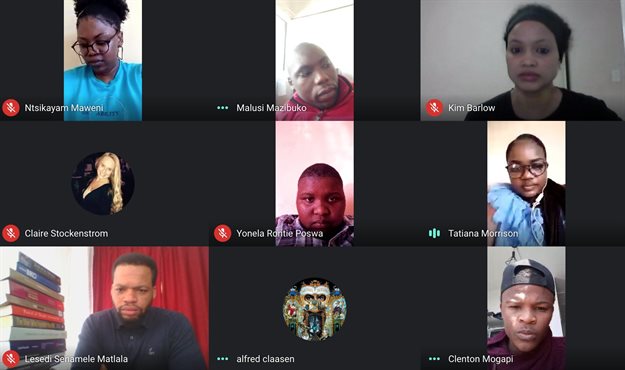Activate! Change Drivers recently held an online panel discussion on how the youth are using their voices under lockdown to amplify current social issues. The panel explored the idea of youth voices under lockdown; whether youth today have any power and what they are doing with it; how the pandemic has changed them; and how they feel about being the ones who will be most burdened by the economic fallout from Covid-19.
The collective opinion of the youth panel was that Generation Z, comprising students and young people just entering the jobs market in South Africa, do not feel heard and resent decisions being made that affect them without being consulting them or being allowed to voice their concerns. They were also largely dismissive of social media as a tool to influence long-lasting change, unless there was a specific issue used to stoke the fires to create change, and saw the activity on social media platforms as reactionary, rather than as a solution for youth voices to be heard by those in power.
Under lockdown
As youth panel facilitator and Activate! Change Drivers network support manager and trainer, Malusi Mazibuko pointed out that for the first time in South Africa’s history, we are all standing in solidarity against an enemy that we cannot see, but we cannot all mobilise and connect physically to deal with the social ills that have been amplified during this time. His questions centred around how youth power can be mobilised and expressed during this time to create change to improve their lives and those of impoverished communities.
Jon-Dylon Petersen, a final year quantity surveying student, said Covid-19 and the lockdown is a reordering of the world order. Ntsikayam Maweni, a final year student in politics and African languages, believes the current generation in South Africa are up for the challenge of building a new world post-Covid: “We have reached the end of the politics of the ‘TRC’ (Truth and Reconciliation Commission) and the ‘Rainbow Nation’.”
SA youth too 'reactionary'
Student Eliene Scott was worried that the youth of South Africa is too reactionary, only getting emotional about the topic of the day, whether it is gender-based violence or racism, and don’t actively sit down and pursue change, meaning that they can’t then expect to control the narrative: “We have a greater opportunity than the youth of 1976 – social media has the power to mobilise far greater numbers than was mobilsed back in the day. Our problem is that we are entitled as young people. We are not silenced. We need to start the narrative to create change in the country. We need to acknowledge that we have a greater advantage than in 1976.”
Maweni added: “We are the youth of today. We find ourselves in spaces where we are carrying hopes and dreams that are not originally ours, that we fetched from the youth of 1976, or the #FeesMustFall era, and we are still trying to figure out what our individual hopes and dreams are.”
Youth dreams have not changed, added political science major Lesedi Senamele Matlala: “We are fighting a lot of things that were there before Covid-19. We are fighting to be heard. People still have hope that things will change. I want to see everyone receive an education. We are still fighting, and we still want things to be okay.”
Thembela Ntlemeza and Sifiso Mazibuko 18 Jun 2020
'Covid-19 has awakened the youth'
Tatiana Morrison, a young radio presenter and poet, said Covid-19 has awakened the youth to the fact that life is too short to play around and they may not have all the time in the world that they thought they did. Morrison agreed that young people do have the power to change their current situation and create change in their communities – as she has seen the youth do in her own community, making masks, educating children on social distancing, and so on. “I know youth actually revamping, planning, going back to school, starting businesses,” she said.
Youth activator, Yonela Rontle Poswa was also encouraged by youth in her community making and selling food after losing jobs under lockdown: “This lockdown has changed our way of thinking. Instead of being boxed in, having to go to an office by 8am, I have seen people creating their own businesses, becoming their own bosses and employing others.”
On social media
Under lockdown, Maweni said youth voices had moved to dominate on social media. “We are not really locked up in terms of our thoughts. We have media platforms where we can voice our thoughts on the pandemic. This is not permanent. Young people can use this time to revamp themselves.” Petersen agreed, saying social media had become a way for the youth to share their lived experiences under the pandemic.
Matlala, who also gives motivational talks, disagreed that the youth were “unlocking” ideas on social media or influencing youth issues. Scott, who is on the SRC at her tertiary institution, feels strongly that the youth are not using the power they could voice through social media: “Social media could be used to advance our power but it isn’t. Social media is also a place of insult. There is so much potential for the platforms to be used for the greater good, but it does not mean we have any power… because we have failed to use it, our power is either limited or coincidental.”
Dreams of a principled, ethical society
Activator Alfred Claasen said the dreams of the youth are being interrupted by social issues that existed before Covid and will exist after Covid, and that his dreams were about a principled and ethical society in which the youth could thrive. Student Clenton Mogapi, who also works at assisting with keeping students in school, added: “Matters are only addressed when we take to social media to highlight specific issues.” He emphasised that the youth still dream, despite Covid, but that everything that comes next will have to be dealt with by this generation of youth.













































